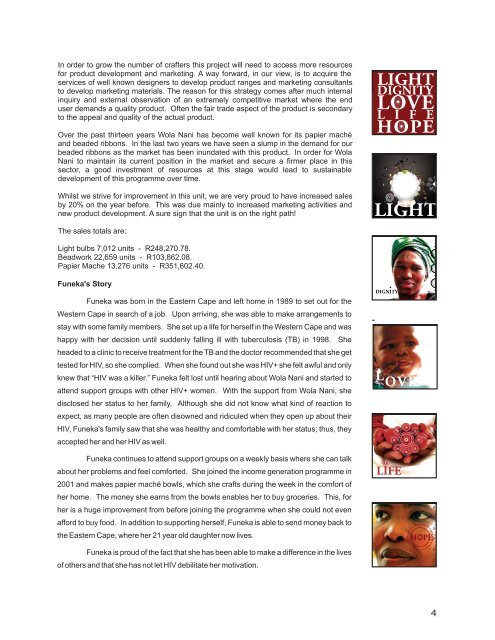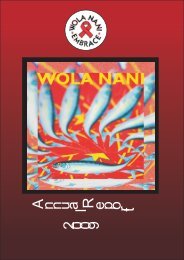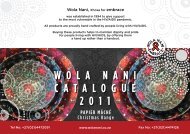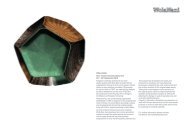Annual report.cdr - Wola Nani
Annual report.cdr - Wola Nani
Annual report.cdr - Wola Nani
You also want an ePaper? Increase the reach of your titles
YUMPU automatically turns print PDFs into web optimized ePapers that Google loves.
In order to grow the number of crafters this project will need to access more resources<br />
for product development and marketing. A way forward, in our view, is to acquire the<br />
services of well known designers to develop product ranges and marketing consultants<br />
to develop marketing materials. The reason for this strategy comes after much internal<br />
inquiry and external observation of an extremely competitive market where the end<br />
user demands a quality product. Often the fair trade aspect of the product is secondary<br />
to the appeal and quality of the actual product.<br />
Over the past thirteen years <strong>Wola</strong> <strong>Nani</strong> has become well known for its papier maché<br />
and beaded ribbons. In the last two years we have seen a slump in the demand for our<br />
beaded ribbons as the market has been inundated with this product. In order for <strong>Wola</strong><br />
<strong>Nani</strong> to maintain its current position in the market and secure a firmer place in this<br />
sector, a good investment of resources at this stage would lead to sustainable<br />
development of this programme over time.<br />
Whilst we strive for improvement in this unit, we are very proud to have increased sales<br />
by 20% on the year before. This was due mainly to increased marketing activities and<br />
new product development. A sure sign that the unit is on the right path!<br />
The sales totals are:<br />
Light bulbs 7,012 units - R248,270.78.<br />
Beadwork 22,659 units - R103,862.08.<br />
Papier Mache 13,276 units - R351,602.40.<br />
Funeka's Story<br />
Funeka was born in the Eastern Cape and left home in 1989 to set out for the<br />
Western Cape in search of a job. Upon arriving, she was able to make arrangements to<br />
stay with some family members. She set up a life for herself in the Western Cape and was<br />
happy with her decision until suddenly falling ill with tuberculosis (TB) in 1998. She<br />
headed to a clinic to receive treatment for the TB and the doctor recommended that she get<br />
tested for HIV, so she complied. When she found out she was HIV+ she felt awful and only<br />
knew that “HIV was a killer.” Funeka felt lost until hearing about <strong>Wola</strong> <strong>Nani</strong> and started to<br />
attend support groups with other HIV+ women. With the support from <strong>Wola</strong> <strong>Nani</strong>, she<br />
disclosed her status to her family. Although she did not know what kind of reaction to<br />
expect, as many people are often disowned and ridiculed when they open up about their<br />
HIV, Funeka's family saw that she was healthy and comfortable with her status; thus, they<br />
accepted her and her HIV as well.<br />
Funeka continues to attend support groups on a weekly basis where she can talk<br />
about her problems and feel comforted. She joined the income generation programme in<br />
2001 and makes papier maché bowls, which she crafts during the week in the comfort of<br />
her home. The money she earns from the bowls enables her to buy groceries. This, for<br />
her is a huge improvement from before joining the programme when she could not even<br />
afford to buy food. In addition to supporting herself, Funeka is able to send money back to<br />
the Eastern Cape, where her 21 year old daughter now lives.<br />
Funeka is proud of the fact that she has been able to make a difference in the lives<br />
of others and that she has not let HIV debilitate her motivation.<br />
4






